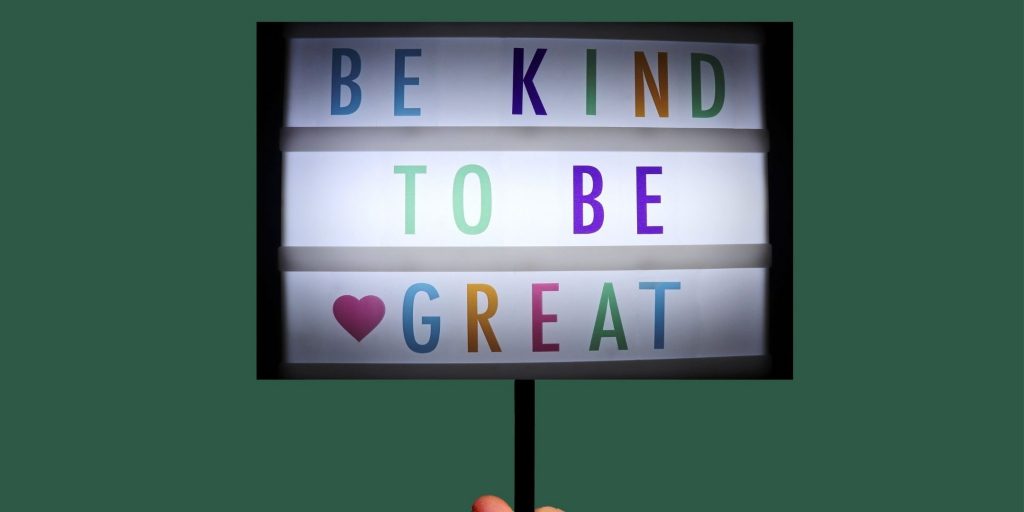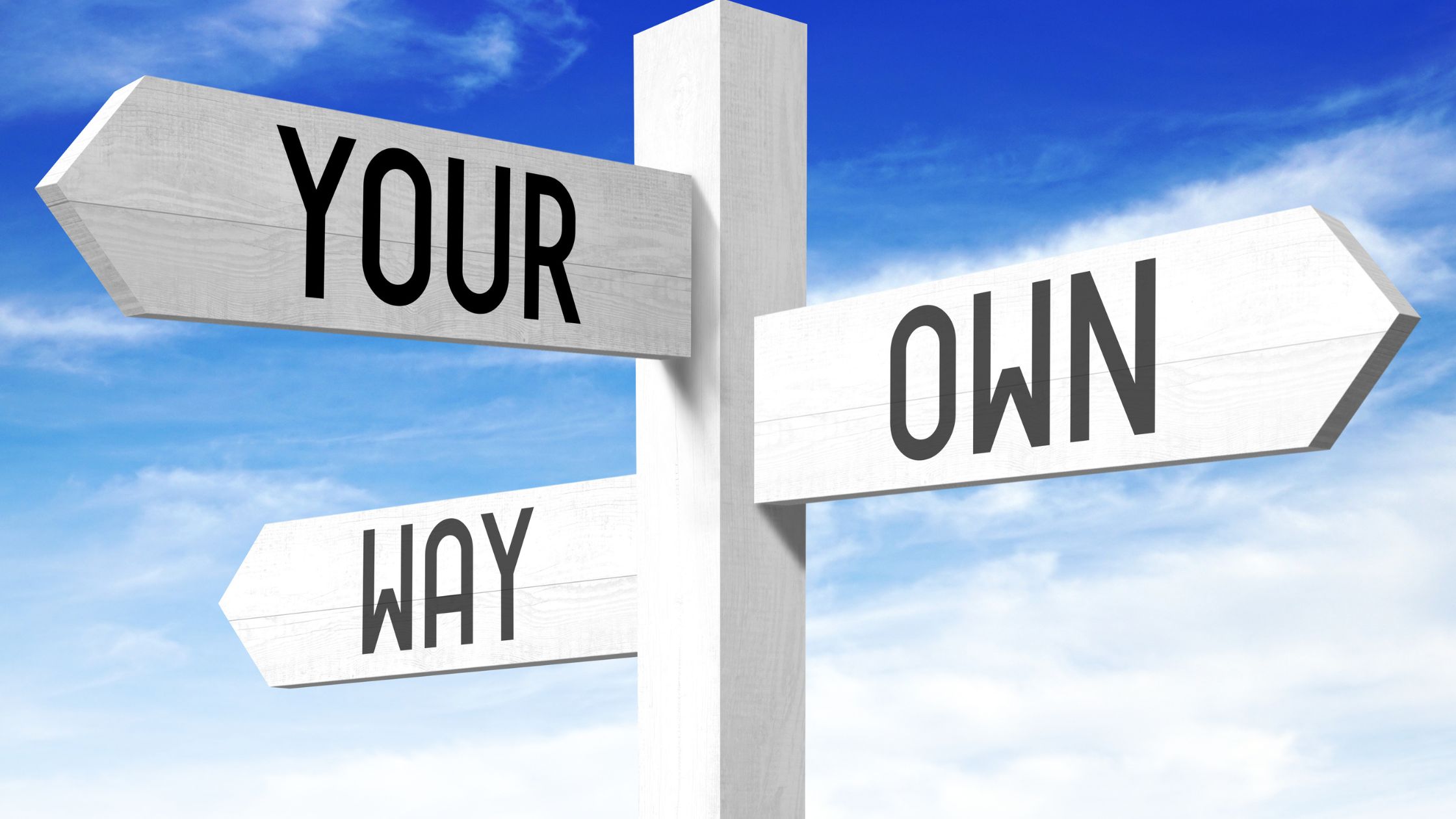Rule 4: Treat others the way you would like to be treated
It’s a shame that we still see people regarding kindness as weakness, whether at work or in life. The old adage, “Treat others as you’d like to be treated.” has stuck around all these years because, quite simply, it’s fantastic advice! Even when you don’t agree with someone, what have you got to lose by being kind? What’s so bad about being kind? You make those around you (and yourself) happier! Happier people also work harder, and isn’t that what any good leader wants for their team?
Oxford University researchers analysed hundreds of papers that examined the link between happiness and kindness and found 21 studies that prove without a doubt that we’re happier when we’re being kind to others. A University of Warwick study also showed that those who are happy at work are 12% more productive than those who are unhappy. So, how can we use this knowledge to improve our leadership? How do we become more effective leaders by being kind, even when we’re in an unpleasant situation?
When you start treating others with kindness, you’re spreading positivity and opening yourself up to the benefits it brings, in life and in your leadership. You cannot effectively lead and motivate your team without kindness, and it’s important that you keep this in mind at all times.
Lori Deschene the founder of Tiny Buddha told a friend that she tries to follow the old adage “Treat people how you wanted to be treated.” The friend responded that he tries to treat people how they want to be treated and this really got her thinking. Lori continues further by saying that she understands that what works for her friend isn’t necessarily what works for everyone; and that there is no right or wrong when it comes to the support we want from other people. What a beautiful way to be there for someone—to try to ascertain what they value in a friendship, and then provide it, without question or judgment. Lori concludes by saying that it’s moving beyond empathy to understanding, and building stronger relationships in the process. We are so similar, and yet so different. Sometimes connection is seeing ourselves in each other. Sometimes it’s stepping outside ourselves, and honouring what we see.
If we look at the workplace situation regarding how people are treated, the days of the tough-as-nails boss that’s, well, a jerk, are on the way out! People are starting to realise that even if jerks get great results on paper, they’re costing their company so much more in the damage they to do the culture and employee morale. Who wants to do business with a jerk? Who wants to do their best work for a jerk? Nobody! It’s time to start realising that niceness and kindness doesn’t mean weakness and that leaders who embrace kindness will see a big improvement in all facets of the workplace.
Mark Cuban, entrepreneur and owner of the Dallas Mavericks, puts it simply (and best): “People hate dealing with people who are jerks.” Studies even back this up, with studies showing that when you have a level of emotional intelligence you’re more likely to be successful and wealthy. This is because, according to Soulaima Gourani (a global career development expert), you become more valuable to a company when you can demonstrate that you’re able to connect and cooperate with others. Empathy, self-control, and dealing with diversity and conflict in a positive way will have your leaders falling over themselves to keep you, because of the influence you have on employee satisfaction (and in turn, staff retention) and company culture.

It’s not enough to be hard-working and a good negotiator; the higher-ups in the workforce are realising that while those are good skills for a leader to have, if your leaders aren’t nice and kind then you’re not valuing your other employees’ satisfaction and wellbeing enough. This leads to large amounts of staff turnover and loses you a lot of money.
Fran Hauser, author of The Myth of the Nice Girl: Achieving a Career You Love without Becoming a Person You Hate, says, “There’s actually something very wrong when kindness isn’t part of the picture when it comes to our leaders. When kindness isn’t modelled and celebrated, we find ourselves in a workplace environment that is, at worst, toxic, and at its best, fails to allow us to reach our full potential and share the best of ourselves with others.”
Finding the right balance of tough and kind can be tricky, but the rewards are well worth it. You don’t have to let yourself be walked over, but being empathetic, approachable and considerate of other people’s feelings will make you a leader others will want to follow and do their best for. Treat others how you want to be treated is a saying that applies to the workplace as well, and we all need to work together to make sure that this culture of kind leadership continues to grow so that we can all benefit.
You can be strong as a Leader and always be kind. You can be courageous as a Leader and show fear. Leadership isn’t a role or title, it is a choice, attitude and action.
I’m going to complete this chapter with one of my favourite quotes about kindness, and I love how it applies to leadership as well:
“Because that’s what kindness is. It’s not doing something for someone else because they can’t, but because you can.”
Andrew Iskander
Author – Sonia McDonald

Sonia McDonald is changing the face of leadership across the globe. She believes we should lead with kindness and courage, from the heart, and is known for her mantra ‘Just Lead’. She leads by example in all these areas and through her transformational coaching, leadership training programs and cultural transformation for organisations and encourages others to do the same. Sonia has helped thousands of people on their leadership journey to become the best version of themselves and in turn, inspire and bring out the best in others.
Sonia is a founder and CEO of McDonald Inc., LeadershipHQ and Global Outstanding Leadership Awards and the newly launched Courage Conference. For more than 25 years, Sonia has been on the front lines of leadership and she is beyond committed to her mission around building a world of great leaders.
She has held leadership positions worldwide and through experience, research and study come to realise what it takes to be a truly great leader. She has been recognised by Richtopia as One of the Top 250 Influential Women across the Globe and Top 100 Australian Entrepreneurs.
Sonia has an ability to speak bravely and authentically about her own development as a leader, personal and career challenges in a way which resonates with her audience. She is a leading coach, an award-winning published author of newly released First Comes Courage, Leadership Attitude and Just Rock It! and has become an in-demand keynote speaker on leadership, kindness and courage.
Sonia has become recognised for her commentary around the topic of leadership, kindness, empathy and courage as well as building outstanding leadership across the Globe.



